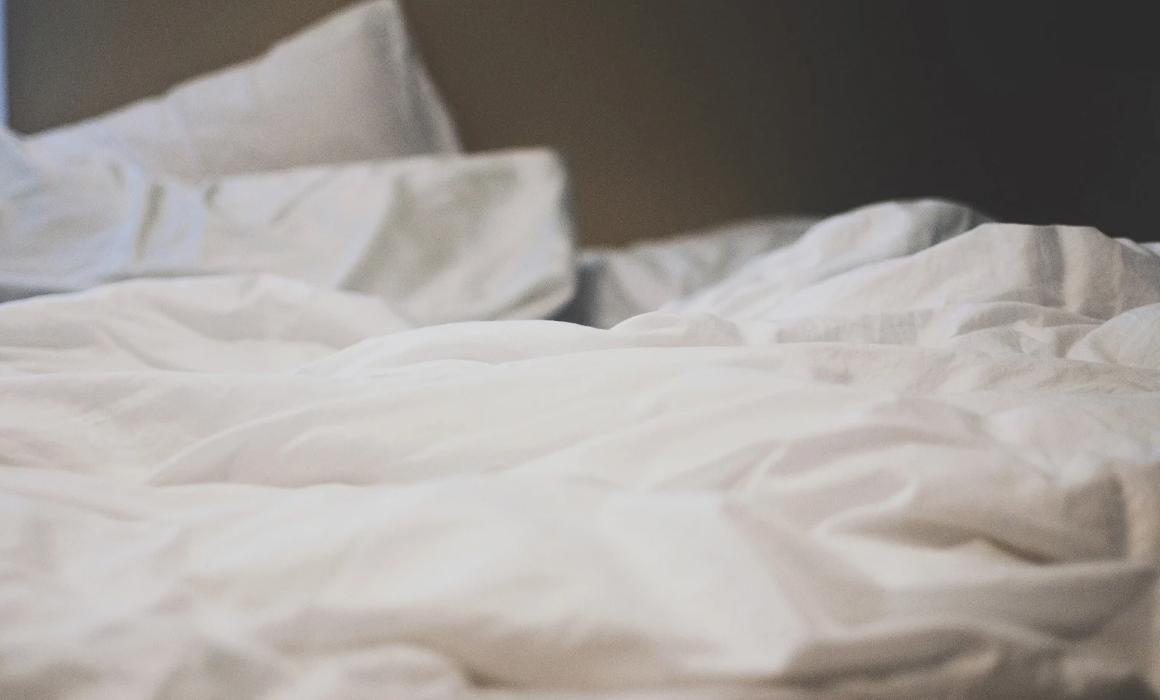
It is quite common to find it difficult to sleep after a breast cancer diagnosis due to both the physical issues following on from surgery and treatment, and the emotional issues that people face in light of a diagnosis. In this article, Emma Herring provides some insight and advice. Please note that this article has been researched and written from a patient experience and we encourage you to speak to your medical team about your personal situation.
By Emma Herring
“I just want to sleep”, is a phrase I often said when I was going through my treatment for primary breast cancer, writes Emma.
After the shock of my diagnosis and then going through surgery for a mastectomy and reconstruction, chemotherapy, further surgery to remove lymph nodes and then radiotherapy, my sleep patterns were all over the place.
There are several things I found that helped and we’ve also gathered some advice and tips from experts on mindfulness and breathing techniques that may help you.
Sleeping after surgery and with drains
I had to learn to sleep in a new position after my mastectomy: lying on my non-surgical side too uncomfortable, so I slept on my back. I bought a v-shaped pillow and propped myself up so I was sitting up slightly. This was also because I had a couple of drains in after surgery. I had a cloth drain bag that I carried them around in and at night I left the drains in the bag and had them lying by my side. It took a few nights to adapt but I still sleep on my back some five years later! To protect my back, I was advised to put a pillow under my knees which really helped and again it’s something I still do.
What to do when you wake up in the night
I often found I woke up a lot in the night, especially when I was taking steroids during my chemo cycles. I had spoken to a psychologist, and she recommended that I got up rather than lie in bed awake. She suggested I went into another room and sat down and read a book, looked at a magazine for 15-30 minutes or listened to soothing music before going back to bed. But she urged me not to look at my phone or iPad.
Keeping a sleep/activity diary really helps
The psychologist that I spoke to also suggested I keep an activity/sleep diary. I wrote down what I had done that day and then how I had slept. It helped to identify patterns. I found that even if I had taken a short walk or just been out in the garden during the day, my sleep was often better.
Other useful tips that help you to sleep:
- Experts advise that in the morning you should expose yourself to as much bright, natural light as possible. Sunlight can help regulate your circadian rhythm and ensures your body produces more melatonin – a naturally-occurring hormone in your body which you need to sleep at night.
- Exercise can help improve sleep. Try to do some regular exercise each day, even just a short walk, but don’t do any rigorous exercise too close to your bedtime.
- Don’t eat a heavy meal close to bedtime or go to bed feeling hungry. Food such as walnuts, tomatoes and rice are said to be high in melatonin which can help with sleep.
- Go to bed when you are tired, and associate your bed with sleep and not anything that could be stressful, so try not to work in your bedroom.
- Create a to do list before going to bed and keep a note pad by your bed so you can write down anything that you think of in the night, know it’s noted, and try to return to sleep.
- Charge your phone outside your bedroom and keep laptops, iPads etc out of the bedroom.
- Think about what you’re sleeping in; my peripheral neuropathy in my feet following chemotherapy makes me think they are cold so I always wear socks to bed to trick my brain. It really works for me. Following surgery, when I had drains and dressings, a front opening nightdress, night shirt or pyjama top was the easiest. If you’re experiencing hot flushes, bamboo sleepwear can help absorb the sweat away from your skin to make you more comfortable.
- Make your bed as inviting as possible. A good friend bought me a sleep spray to put on my pillow. The soothing smell of lavender really helped me relax when I was feeling tense and anxious. There are lots of sprays out there – it’s maybe something you can ask a friend to buy you.
All of these tips for good “sleep hygiene” can be very helpful, but if you continue to have sleep problems and have true insomnia to the extent that you can’t get to sleep when you go to bed and or you’re awake for hours in the night, then there are trained sleep professionals who can provide a form of CBT that may help you. This involves looking at your sleep and creating sleep schedules along with other professional advice. Speak to your treatment team for advice, or contact your GP to see if you can get an NHS referral.
Breathing techniques to help you sleep
Louisa Rasmussen who runs the excellent www.breathebalancebe.com was diagnosed with secondary breast cancer in 2017. She offers some breathing tips that could help you with sleep.
What comes before sleeping? Breathing! Healthy, easy breathing during the day can help us get a better night’s sleep at night. How we breathe affects our mental, physical and emotional state, which all have an impact on our sleep quality. Some daytime breathing tips for a good night’s rest include:
- Taking slow nasal breaths when you open the curtains in the morning. Look at the natural light and the views outside your window.
- Give yourself mini breaks in the day to allow your nervous system to wind down a little (this will make it a bit easier to wind down later in the evening). For example, place one hand on the belly and one on the chest, close your eyes, take four slow belly breaths (in and out of the nose if you can), with every exhale, allow your body to relax a little.
Once you’re comfy in bed in your favourite sleeping position, imagine that you’re breathing in calm and relaxation, and breathing out any tension. If you wake in the night, remember that is ok and it’s natural for us to wake sometimes at night. We can come back to slow soft breaths; breathing in for a count of three, pausing gently for a count of two and exhaling for a count of five. Continue that a few times and allow yourself to return to sleep for the rest of the night. Try not to be too hard on yourself, the harder we try the harder it is. Soft easy breaths day and night can help our body and mind to get better rest.
Using mindfulness to help you sleep
Laura Ashurst, a mindfulness meditation teacher offers some mindfulness ideas to help with sleep.
A diagnosis of breast cancer is a traumatic life event that triggers our stress response. Our increased levels of adrenalin and cortisol can often detrimentally impact upon the production of melatonin, our precursor to sleep.
My personal experience of a mastectomy to my right breast followed by an immediate reconstruction on the same day using part of my latissimus dorsi muscle and skin tissue from the right side of my back, meant that I was unable to go to sleep on either my right side or my back, both of which were my usual sleeping positions. With the use of a carefully-positioned pillow, placed in such a way that I didn’t roll over on to my right side, I had to learn to sleep on my left side. In the weeks and months following my surgery, this really affected my quality of sleep.
From a mindfulness perspective, there are several techniques that we can use as part of sleep preparation to help induce the process of sleep and to help during periods of being awake during the night when sleep feels as though it’s far from reach.
How to optimise your day for better sleep at night
Making mindful choices about our intake of alcohol and caffeine during waking hours can impact greatly upon sleep patterns. Some sleep experts suggest making a choice not to drink caffeinated beverages past 2pm. This reduces adrenalin and cortisol levels to allow optimal production of melatonin, which helps us sleep.
Instead of a drink containing caffeine, we can choose to have a soothing herbal tea. The process of creating a mindful pause as we enjoy the drink allows us to slow down as we focus on that one activity. Mindfully drinking the tea will dampen down our stress responses, and could look like:
- Tuning in to the sensation of touch as we hold the warm cup in our hands, acknowledging its shape and observing how that feels
- Slowly savouring its taste as we take a sip from the cup
- Noticing the sounds that we can hear our body make as we drink
- Breathing in the aroma of the herbal tea and acknowledging its colour with our sense of sight
The best bedtime routine to help you sleep
What we do in the hour leading up to bedtime is really important as part of mindful sleep preparation. Making a conscious choice to limit exposure to tech and mobile phones in the hour before bedtime really does help. Our stress hormones naturally spike during scrolling, as our brains make comparisons and judgements triggered by what we see on our screens.
Belly breathing helps to activate the parasympathetic nervous system, stimulating the process of ‘rest and digest’. This helps to naturally reduce the output of adrenalin and cortisol that the sympathetic nervous system stimulates. Choosing to consciously breathe in this way, for five to ten minutes at bedtime, generates feelings of relaxation and calm. Belly breathing can be done in a seated upright position, in a standing position or, and if you’re able to, lying in a supine position, on your back.
- Gently place both hands softly over the belly, palms facing down with the fingertips of the left and right hand almost touching. Notice if there is any tension in the fingers and see how it feels to generate a feeling of softening in the hands.
- Take an inhalation through the nose and allow the belly to rise and move outwards as the inhalation comes in, so that the fingertips move away from each other as the belly naturally rises. Choose to follow the journey of the breath for the full inhalation, noticing the sound of the breath and the sensations that its movement creates in the belly and throughout the body.
- The inhalation naturally turns into an exhalation and as the breath leaves the body through the nostrils, notice the belly gently falling back to its original position.
- Invite the process of observing the belly being breathed in this way for several cycles of the breath perhaps for around five minutes.
Further information
Breast Cancer Now has a useful page on its website about sleep disruption during breast cancer treatment
Macmillan Cancer Support has information on its website if you’re having trouble as a result of a cancer diagnosis and treatment
This NHS website which is part of the Every Mind Matters campaign has some useful tips on sleep.
This NHS website has advice on sleep & tiredness
This is an NHS website offering advice on insomnia
Dr Michael Mosley has a new podcast called Sleep Well which you can find on the BBC Sounds App
Do speak to your treatment team if you are having sleep issues. They may have advice, and could refer you to local services that can offer more help.
Future Dreams hold a range of support groups, classes, workshops and events to help you and your carers during your breast cancer diagnosis. These are held both online and in person at the London-based Future Dreams House. To see what’s on offer and to book your place, see here.
To return to the homepage of our Information Hub, click here where you can access more helpful information, practical advice, personal stories and more.
August 2023
Unless otherwise specified the information and content provided on this page has been written from a patient’s perspective then reviewed by a breast care nurse and it is intended for information and educational purposes only. It is not intended to substitute for professional medical advice. Please contact your medical team for advice on anything covered in this article and/or in relation to your personal situation. The links and/or recommendations in this article to third-party resources are for your information and we take no responsibility for the content contained in those third-party resources. Any product recommendations made in this article are not product endorsements and unless otherwise stated, they are made without any affiliation to the brand of that product. We ask you to note that there may be other similar products available.
Share

Support awareness research
Donate to those touched by BREAST cancer
Sylvie and Danielle began Future Dreams with just £100 in 2008. They believed nobody should face breast cancer alone. Their legacy lives on in Future Dreams House. We couldn’t continue to fund support services for those touched by breast cancer, raise awareness of breast cancer and promote early diagnosis and advance research into secondary breast cancer without your help. Please consider partnering with us or making a donation.




